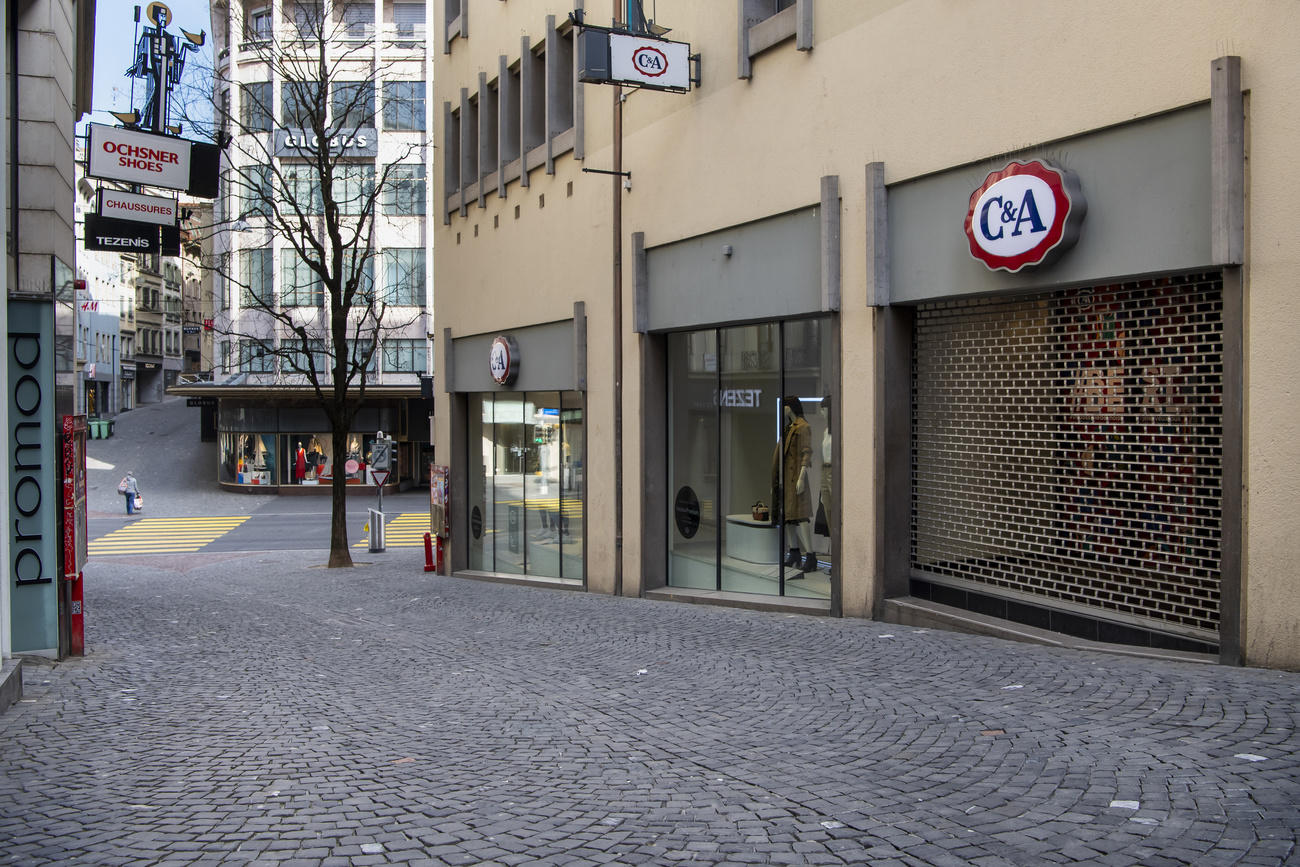
Coronavirus fallout threatens existence of small companies

Switzerland is a land of small companies, making up 99% of all firms and two-thirds of the workforce. Many are now threatened by the coronavirus crisis despite the government stumping up CHF10 billion ($10.6 billion) in emergency funds to ease the situation.
Restaurants, bars and non-essential shops have been ordered to close their doors until April 19. Border restrictions have been introduced and public gatherings have been restricted.
This puts the retail, tourism, hospitality and event management sectors in immediate danger. With the economy tipped to shrink in the coming months, small manufacturing firms that supply larger companies, will also face a challenge.
From the CHF10 billion aid package, some CHF8 billion will compensate employees who have been told to stay at home and not work. Companies now have to give less notice of their intention to tap into the fund (three days instead of ten) and it has been extended to employees on temporary contracts. But small business owners and the self-employed will have to fend for themselves.
“Coronavirus affects everyone exactly the same. But the financial aid measures are not for everyone. It is so unfair to find yourself frozen out of the system,” a partner at a dental practice told swissinfo.ch.

More
Coronavirus: the situation in Switzerland
Unequal playing field
The practice in the eastern canton of Appenzell Outer-Rhodes has been run by a husband and wife team for seven years. It has taken all of that time for the business to pay off the debts it racked up setting up operations.
The cantonal authorities have effectively ordered it to cease operations, allowing it to open its doors for emergency procedures only. This is because dentists are a high-risk group for picking up the virus from patients. The six people employed by the practice are covered by a state fund that compensates lost wages during extreme economic downturns.
But the registered owner and his wife, who is a partner in the business, cannot access the shortened hours compensation fund. “The only way we can survive is to take out more bank loans. We can only survive on this debt for a few months,” the partner, who did not want to be named, told swissinfo.ch. “It is unfair that employees in effect get a paid holiday, while the people taking all the risk in running a business end up with nothing.”
This is a point taken up by the Swiss Small and Medium-sized Business Association, which is demanding that financial aid be extended to the self-employed and owners of micro-companies (fewer than 10 employees).
“It won’t help employees if a micro-company goes bankrupt because the owners have to get over their heads in debt. In this case, even employees who are entitled to short-time work benefits will lose their jobs,” it statesExternal link.
Bigger fund needed
The State Secretariat for Economic Affairs (Seco) says it has received thousands of enquiries about the short-time working hours fund and other measures, such as bridging loans. It is also considering how to refine the financial aid system to close loopholes but doesn’t as yet have all the answers.
The KOF Swiss Economic InstituteExternal link at the Swiss Federal Institute for Technology (ETH Zurich) says the financial support system will fall short of protecting businesses in the current climate. It has called for the creation of a CHF100 million emergency loan fund and a temporary easing of obligations for companies to declare insolvency.
State support is more essential than ever before, says HotellerieSuisse that represents the hotel industry. Member companies expect revenues to drop by at least 45% for March and April. The Swiss Retail Federation (representing firms that employ 310,000 workers) reports non-food sales plunging between 30% and 60% with two-thirds of firms expecting to announce shortened hours for staff in the coming weeks.
But Seco points out that it is constrained by fiscal laws, known as the Debt Brake, that puts limits on the amount of debt the country can rack up.
Financial aid
On March 13, the Swiss government announced a CHF10 billion package to help shore up the economy during the coronavirus crisis.
The last time the state stepped in to prop up the economy with short-time work compensation and bridging loans was after the 2007/8 financial crisis. On this occasion however, many companies are also faced with the order to close their doors altogether.
Most of the funds, CHF8 billion, will compensate 80% of salaries for employees who have been told to shorten working hours.
Nearly CHF1.6 billion has been set aside to offer state-guaranteed bridging loans to companies that are on the brink of collapse or those that cannot find enough money to cover immediate bills.
The remainder will target specific sectors, such as events management.

In compliance with the JTI standards
More: SWI swissinfo.ch certified by the Journalism Trust Initiative
































You can find an overview of ongoing debates with our journalists here . Please join us!
If you want to start a conversation about a topic raised in this article or want to report factual errors, email us at english@swissinfo.ch.